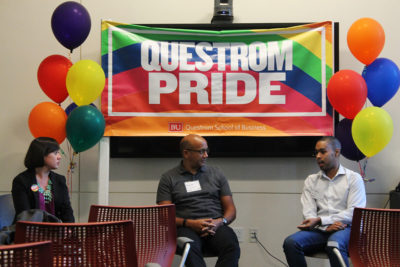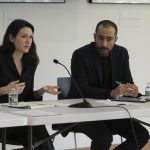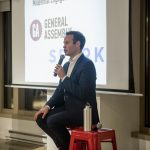
Just out of college, David McFarlane, now a partner at Converge Venture Partners, entered the job search and received a promising offer. But after McFarlane disclosed his sexuality to his potential employer, any future with the company shattered.
Last Thursday, McFarlane and others shared their experiences of being openly gay in the workplace at“Out at Work,” a panel held by Questrom Spectrum, an undergraduate student advocacy group for LGBT students in business at Boston University.
Questrom Spectrum organized the event in hopes that LGBT students could learn how to navigate being out in the workplace from professionals with experience.
Kathleen Keegan, president of Questrom Spectrum and junior in the Questrom School of Business, thought of the event while talking to Cecilia Yudin, assistant director at the Questrom Undergraduate Academic and Career Development Center.
Keegan and Yudin said they felt that while Questrom teaches students about many different business tools, it does not instruct students on how to navigate openly identifying as LGBT in the workplace.
“We can teach [students] all the curriculum, but if we can’t give them the tools to be comfortable in their new jobs, then we’re not preparing them,” Yudin said.
McFarlane said feeling comfortable at work is important.
Early in his career, he said, he learned how to converse socially with colleagues without revealing his sexuality. Later on, McFarlane began talking about his life with his partner because he felt it was unfair to hide that part of himself.
“Not saying anything felt like I was denying [my partner] somehow, like I was not being true to him,” McFarlane said to the crowd. “I felt like … I’ve always got this slightly covert, deceitful behavior going on, and so I just didn’t want to live my life like that.”
Rebeccah Lilas, manager of transaction tax at Ernst and Young, said she brings up her partner and her work with LGBT advocacy groups in job interviews so that employers know she is gay.
However, Lilas said that the focus of interviews should be on professional skills and experience because that is what matters most at work and in the application process.
“You don’t want them to say, ‘Oh, that was the gay candidate,’” Lilas said. “You want them to say, ‘No, this is the candidate that is super amazing, has great grades, is brilliant and funny, and bonus, she’s pretty awesome and has an awesome partner.'”
Regarding those who are uncomfortable when they find out a colleague is gay, McFarlane believes patience is key. He explained that many in the LGBT community need time to come to terms with their identity, so others may need some time, too.
“When they finally do come out, the expectation is that anybody they say [their sexuality] to is instantly aligned to exactly what you’re thinking,” McFarlane said to the audience. “They should be instantly sympathetic and empathetic to everything that you’ve actually maybe taken quite some time yourself to work through.”
Lilas has encountered several situations where colleagues asked inappropriate or uncomfortable questions, but she felt she effectively resolved the issue by pulling them aside and expressing her discomfort.
Panelists also touched on their struggles with intersectional discrimination. Collin Kelly, a human resources associate at Liberty Mutual, said he may not be initially judged for his sexuality but instead race because that is apparent externally.
Keegan said she hoped this event would attract allies in LGBT advocacy.
“While Questrom does an excellent job preparing students for interviewing and for being a part of the professional landscape, Questrom itself doesn’t really provide resources for what it’s like to be gay or part of the LGBT community throughout these processes,” Keegan said.
Matthew Dougherty, a Questrom sophomore, said that attracting non-LGBT students to the event was key. Dougherty, who is gay, has worried about life in the workplace, but said he believes panels like these can raise awareness.
“It’s important to have that representation,” Dougherty said. “It not only validates people within the community, but it says to people outside of the community … that this is what we accept here.”




